“What's your opinion on AVIF files? I just read the first time about it, and I'm currently researching it but somehow information is limited. Do you guys have experience with it?”-Reddit user.
AVIF files are becoming more popular, and it's easy to see why. This image format has a modern solution for those who want to maintain high quality photos while reducing file size. Imagine being able to store more photos without sacrificing clarity; that's what the AVIF format can do! So, if you're new to this format, AVIF is worth exploring. Let's dive into AVIF format applications, advantages, and more.
In this article
Part 1. What is AVIF Format?

AVIF (AV1 Image File Format) is a new image format that uses the AV1 video codec for image compression. It was created to provide a high-efficiency, open-source alternative to existing image formats like JPEG, PNG, and WebP. AVIF allows for superior compression, meaning it can reduce the size of image files without losing quality.
AVIF is a better option than the traditional JPEG format due to its superior compression abilities. It can produce high-quality images with much smaller file sizes compared to JPEG. Netflix's technical team demonstrated this by compressing both formats to 0.08MB, showing that AVIF retained much better quality, while JPEG showed issues like color banding and loss of detail.
Here’s why AVIF is a great choice:
- AVIF supports high dynamic range (HDR) imaging, with 10- and 12-bit color, resulting in images up to 10 times smaller than other formats.
- It is royalty-free, meaning there are no licensing fees.
- Backed by tech giants like Google, Amazon, Netflix, and Microsoft, it has strong industry support.
- AVIF provides excellent compression, maintaining high quality at smaller file sizes.
- It includes modern features like transparency, HDR, and a wide color gamut, making it versatile for different uses.
Part 2. The AVIF Image Format Structure and Elements
The AVIF file format is built on the ISO Base Media File Format (BMFF). This is a flexible framework used to store different types of media, including video, audio, and images. Because of this, AVIF shares its structure with other BMFF-based formats, like MP4.
AVIF File Structure

An AVIF file is made up of several "boxes," which act like containers for storing different pieces of data and metadata. At the top is the File Type Box (type), which identifies the file as an AVIF and specifies the format version. Other important boxes include the Media Data Box (mdat), where the actual image data is stored, and boxes like the Item Location Box (iloc) and Item Properties Box (iprp) that store metadata and other information.
Image Data

The image data in AVIF files is compressed using the AV1 codec and stored in a box called the Compressed Image Item Box (ISP). Each image frame has its box and comes with information about how it was encoded. This structure also allows AVIF to hold multiple images, such as thumbnails or different resolutions of the same image, in one file.
Metadata

AVIF files can include metadata like Exif, XMP, and ICC profiles, which contain details about the image’s creation and properties. These are stored in separate boxes, allowing easy access to this information without affecting the image data itself.
Part 3. AVIF Format Applications and Use Cases
The AVIF format is mainly used as a more efficient option compared to older image formats like JPEG and PNG. AVIF helps websites and apps load faster and reduces the amount of data needed.
Beyond its performance advantages, AVIF offers many modern features. It supports high dynamic range (HDR) imaging and a wide color gamut, which can produce vibrant, detailed images on HDR-capable screens. It also supports transparency and animation for designing graphics and interface elements. As more browsers, image editing tools, and content delivery networks (CDNs) add support for AVIF, its use is spreading across industries like eCommerce, media, and social media.
Part 4. Advantages and Disadvantages of AVIF Format
The AVIF format is gaining attention for its compressed images without losing quality. As an open-source format, it provides high-quality visuals with smaller file sizes. However, like any technology, AVIF has its limitations. Let's see AVIF's advantages and disadvantages below:
AVIF Format Advantages
The AVIF format brings several key benefits compared to older formats like JPEG and PNG:
- Better compression. AVIF uses advanced encoding from the AV1 codec, which allows for much smaller file sizes without reducing image quality. In fact, AVIF images can be up to 50% smaller than JPEGs, offering the same visual quality but taking up less space.
- High-quality visuals. AVIF supports features like HDR imaging, wide color ranges, and transparency.
- Free to use. AVIF is based on the open-source AV1 codec, which means there are no fees or licensing restrictions.
- Broad compatibility. Major browsers like Chrome, Firefox, and Edge support AVIF. Also, many image editing tools and content delivery platforms are adopting it.
AVIF Format Disadvantages
Despite its many benefits, AVIF does have some drawbacks:
- Limited support on older browsers. At the same time, browsers support AVIF, but older ones like Internet Explorer do not. In this case, developers might need to provide backup formats like JPEG for full compatibility.
- Longer encoding times. The advanced compression used by AVIF can take longer to process than JPEG or PNG. This can be an issue for users handling large numbers of images quickly.
- Limited support in some editing tools. Although tools like GIMP and ImageMagick support AVIF, not all platforms do. For example, Adobe Photoshop may require plugins or conversion to other formats for editing AVIF files.
Part 5. How to Fix Damaged Image AVIF?
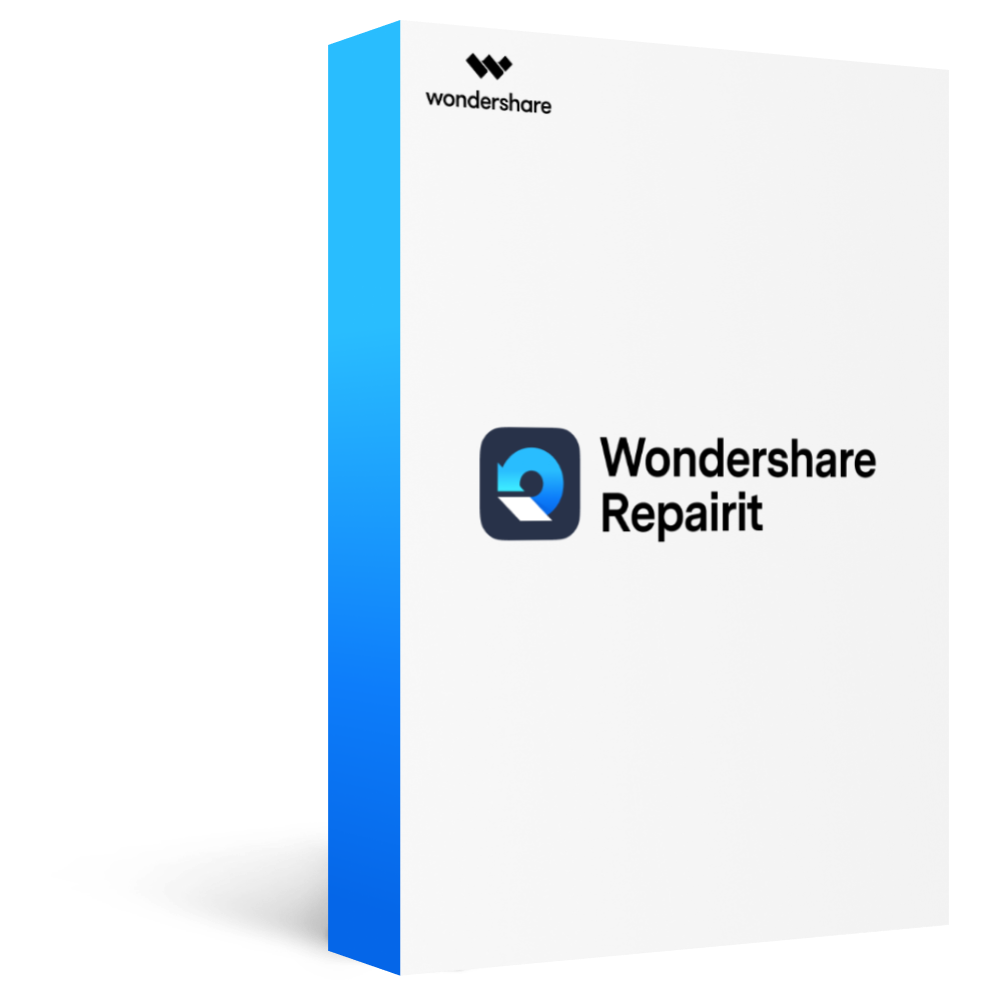
-
Repair damaged AVIF photos with all levels of corruption, such as grainy photos, dark photos, pixelated photos, faded photos, etc.
-
Repair critically damaged or corrupted AVIF photos available on SD cards, phones, cameras, USB flash drives, and more.
-
Repairit has a quick and advanced repairing mode. You can use either depending on the level of corruption the photos has undergone.
-
The "AI Image Upscaler" feature can enlarge the repaired photos to 2X, 4X, and 8X.
-
No limit to the number and size of the repairable photos compared with the online version of Repairit.
-
Support Windows 11/10/8/7/Vista, Windows Server 2003/2008/2012/2016/2019/2022, and macOS 10.12~macOS 14.
AVIF image files can become damaged due to interrupted downloads, improper file transfers, or corrupted storage media. In this kind of scenario, one of the best solutions we can offer is Repairit AVIF Image Repair. This tool handles various problems, from distorted colors and pixelation to broken or incomplete image files. This tool can also manage batch repairs, allowing you to fix multiple AVIF files at once. What you will like here is, Repairit’s repair process is user-friendly, with just a few simple steps. Let check how:
Step 1: Go to the "More Types Repair" section, then choose "Photo Repair." Next, click the Add button and upload the AVIF photos you want to repair.
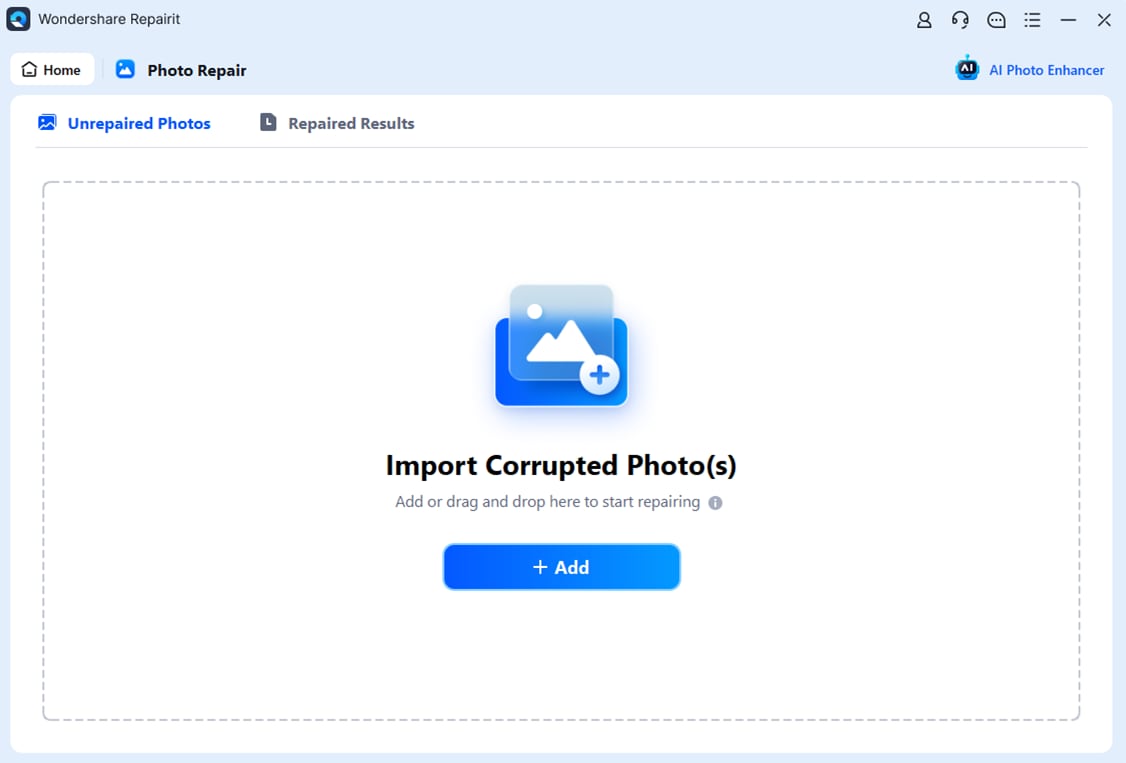
Step 2: Once your AVIF photos are uploaded, click on the Repair button to start the process. When the repair is complete, you'll be notified of the results. If the repair was successful, you can save the AVIF image by clicking Save, then choose a folder to store it.
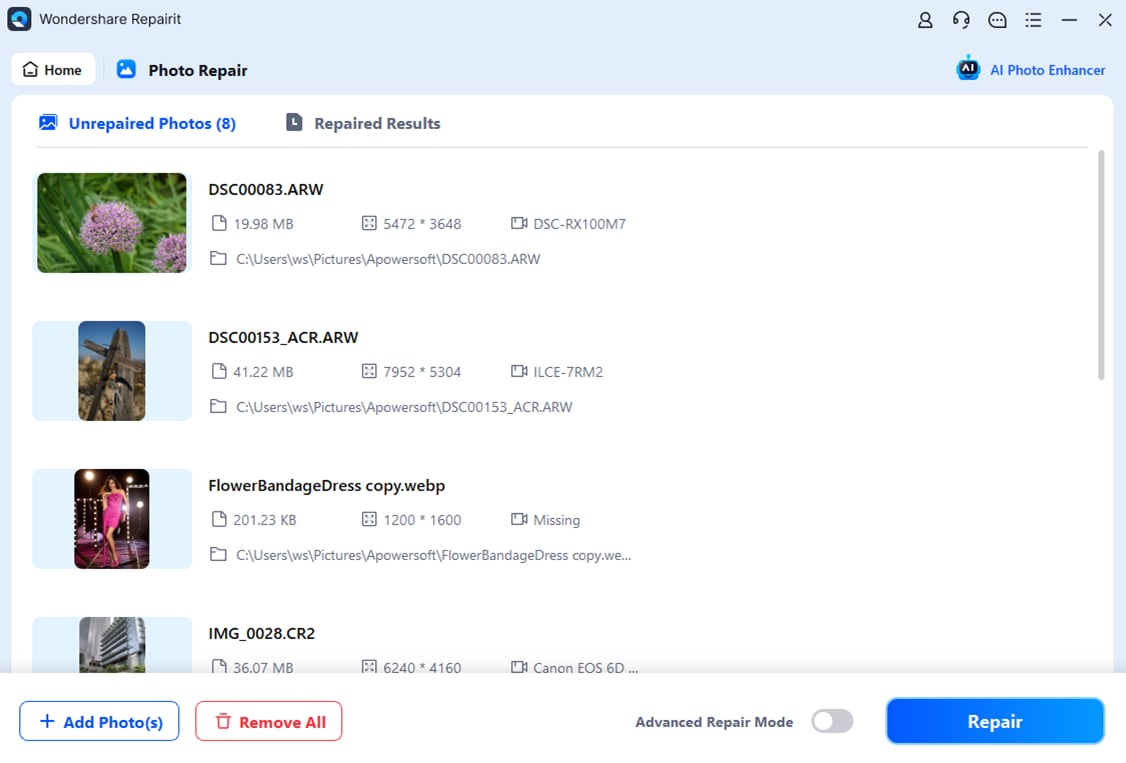
If the standard repair process didn’t work as expected, click on Advanced Repair. You just need to add a sample AVIF photo that was taken on the same device as the corrupted one and in the same format. Once the sample photo is uploaded, click Repair and wait for the advanced repair to finish.
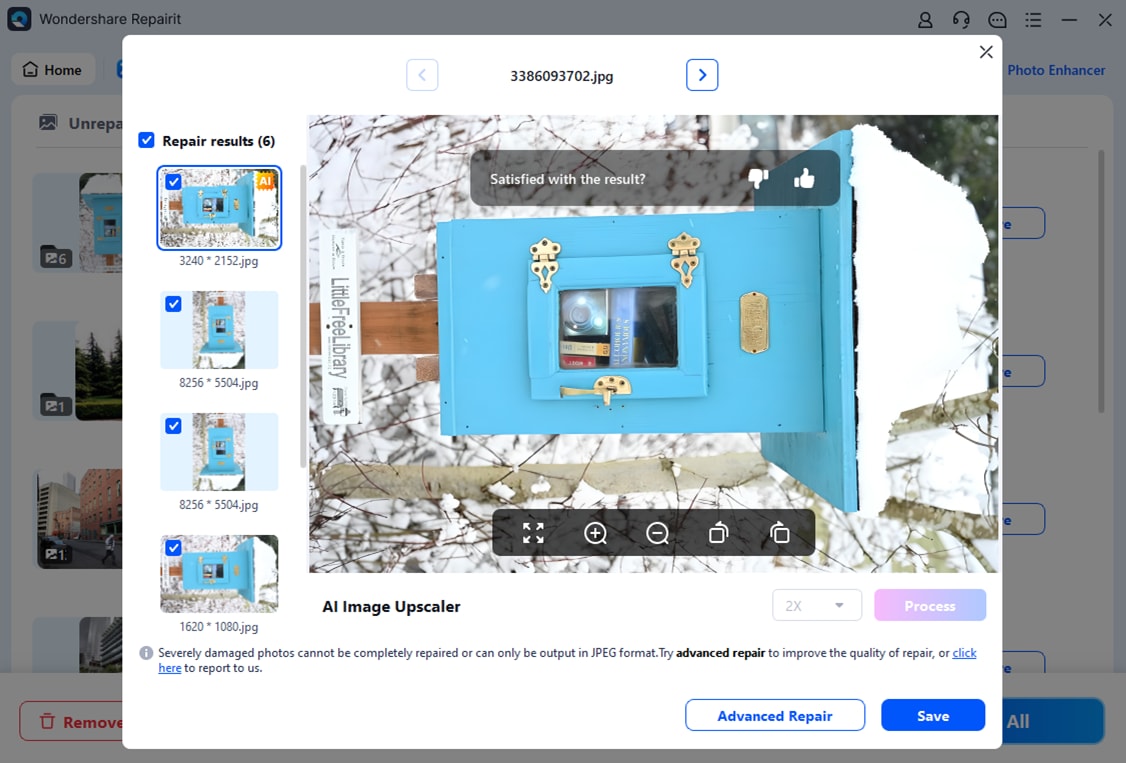
Step 3: Finally, to save your repaired photos, click on the Save button in the preview panel. If you have multiple photos, you can select them all and click Save All to export them to your desired location.
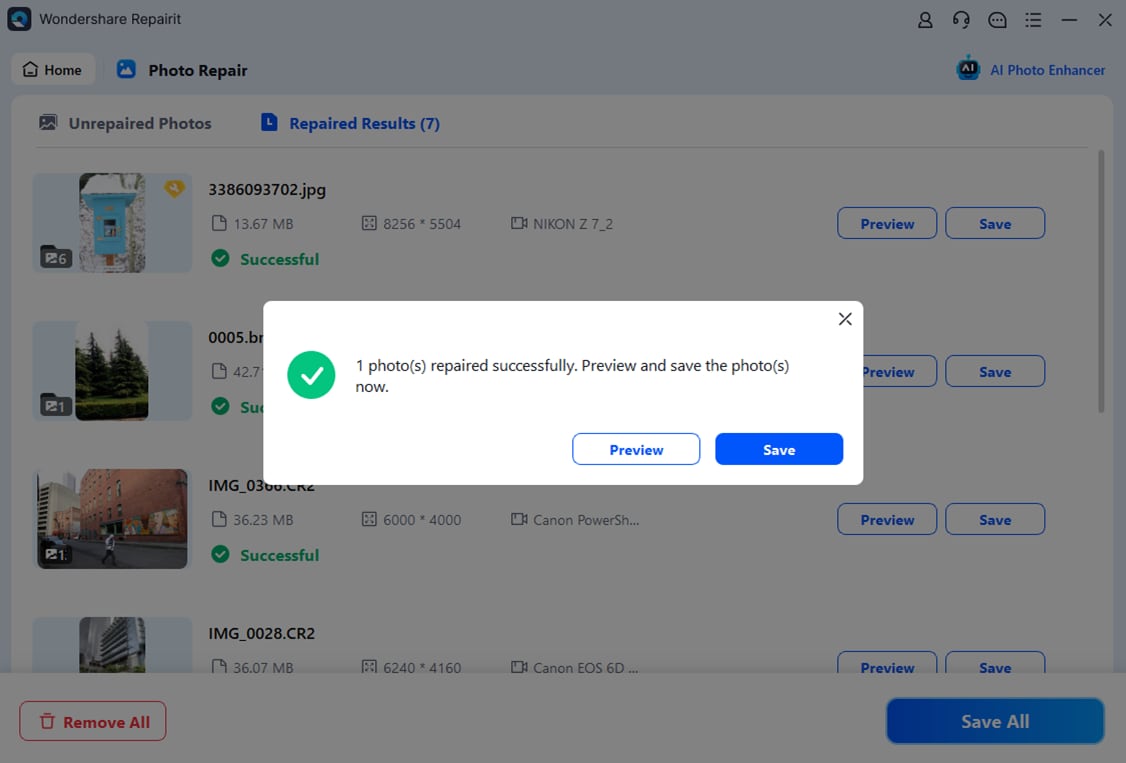
Fix Damaged Image AVIF

Conclusion
In summary, AVIF is an efficient image format that brings quality while saving space. Despite its advantages, like smaller file sizes and support for HDR, it’s not without challenges, such as limited support in older browsers. While AVIF provides numerous advantages, it's important to keep in mind its limitations. As AVIF adoption continues to grow, it’s clear that this format is set to play a great role in the future of images.
FAQ
-
Why is my AVIF image not loading properly?
Your AVIF image might not be loading correctly due to an interrupted download, a corrupted file, or a lack of browser support. Try re-downloading the file or using a browser that supports AVIF images. If the image is corrupted, you can use a repair tool like Wondershare Repairit to fix it. -
Can the AVIF format be edited in Photoshop?
Currently, Adobe Photoshop doesn’t fully support AVIF natively. You may need to install a plugin or convert the AVIF file into a more widely supported format like PNG or JPEG before editing. -
How do I convert WebP to AVIF?
To convert a WebP image to AVIF, you can use online converters or image editing software that supports both formats. Some tools allow batch conversion for processing multiple files at once.


 ChatGPT
ChatGPT
 Perplexity
Perplexity
 Google AI Mode
Google AI Mode
 Grok
Grok

